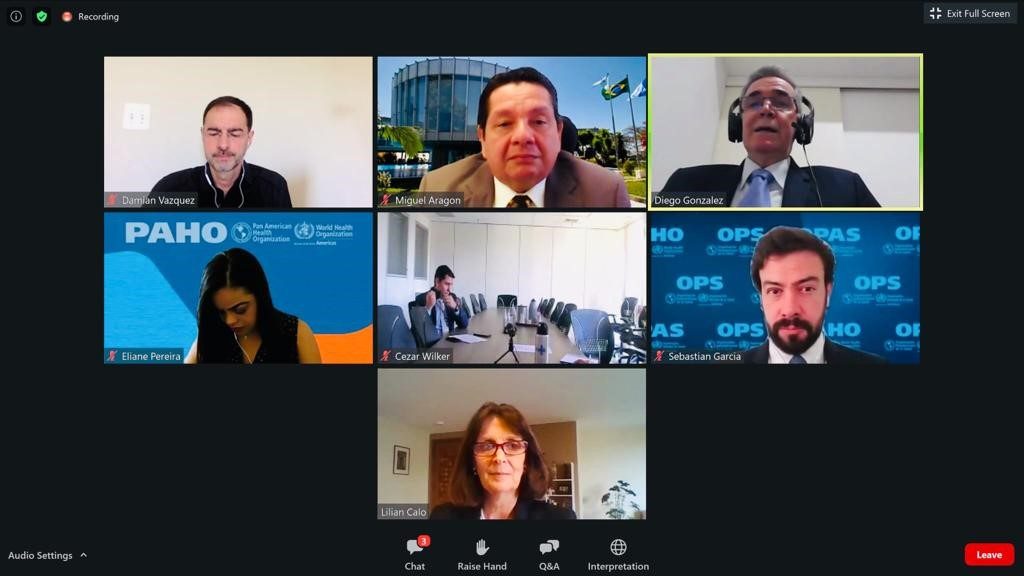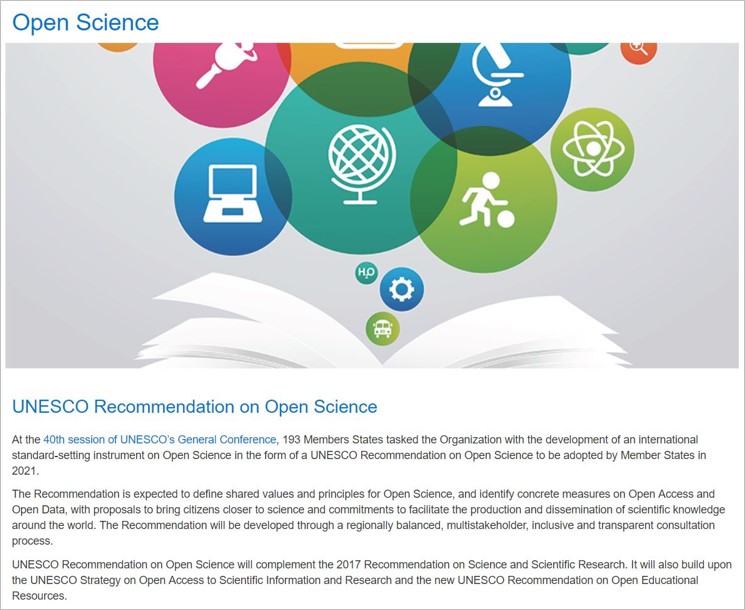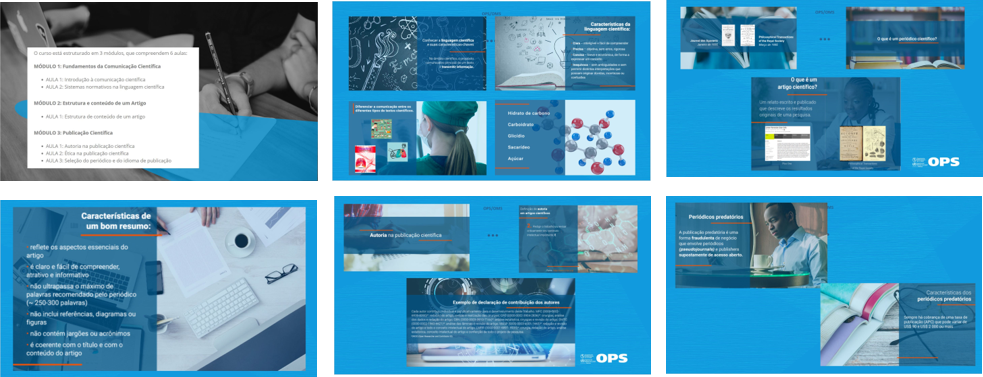As a result of an initiative of the Pan American Health Organization/World Health Organization (PAHO/WHO) through its Latin American and Caribbean Center on Health Sciences Information (BIREME) and PAHO’s Knowledge Management Unit (KM), both members of the Department of Evidence and Intelligence for Action in Health (EIH), a Basic Course on Scholarly Communication in Health Sciences in Portuguese was inaugurated on April 27th.
The Portuguese version of the course, originally written in Spanish and inaugurated in November 2019, was made possible through the partnership with the General Coordination of Information and Documentation of the Secretariat of Administrative Affairs of the Ministry of Health of Brazil within the framework of a Cooperation Agreement through the PAHO/WHO Office in Brazil.
The online launch session included 292 participants from 12 countries and was moderated by BIREME Director Diego González, who welcomed The Deputy Secretary of Administrative Affairs of the Ministry of Health, Cezar Wilker Tavares Rodrigues. The Deputy Secretary valued the partnership with PAHO/WHO through BIREME and recognized the importance of improving the process of publishing scientific research results through the proper writing of articles and reports, inviting everyone to enroll in the course.
Next, representing Socorro Gross, PAHO/WHO representative in Brazil, Miguel Aragon, Consultant in Communicable Diseases and Environmental Determinants of Health, affirmed that scientific communication is a priority for PAHO/WHO and its Member States, especially in the current context of the Covid-19 pandemic, where we observe a huge flow of scientific and non-scientific information through social networks, referring to false information about the disease conveyed in the media, challenging society and health authorities. Aragon also stressed the universal character of the course, which, because it is available online, can be accessed by interested parties especially in Portuguese-speaking countries — strengthening the organization’s technical cooperation beyond the Region of the Americas.
 Diego González stressed that “it is important to consider that “what is not published is not known” and in the Region of the Americas there is a huge wealth of research and experiences that we must know how to communicate and give visibility. This is one of the main objectives of this course and is a priority for international organizations such as PAHO/WHO”, he elaborated, when introducing the PAHO/WHO Regional Advisor for Knowledge Management and Networks, Eliane Pereira dos Santos.
Diego González stressed that “it is important to consider that “what is not published is not known” and in the Region of the Americas there is a huge wealth of research and experiences that we must know how to communicate and give visibility. This is one of the main objectives of this course and is a priority for international organizations such as PAHO/WHO”, he elaborated, when introducing the PAHO/WHO Regional Advisor for Knowledge Management and Networks, Eliane Pereira dos Santos.
Eliane Santos spoke about Scientific communication: a priority for PAHO/WHO in a dialogue composed of four elements: Knowledge generation: evidence production; need for information: evidence for action; circulation: new information needs, re-use; and Access: in the context of the production of new knowledge. In addition, her presentation placed the component of information and scientific evidence as an axis that guides technical cooperation within the Organization.
The history of the creation of the Organization’s official scientific information vehicle, the Pan American Journal of Public Health, it is confused with the organization’s own history when, in 1920, its Member States agree to the creation of the Boletín Mensual Panamericano de Sanidad, which evolved to the current format of an arbitrated, trilingual journal in digital format and which publishes state of the art public health research based on global and regional priorities, indexed in the most prestigious databases and that garners international recognition.
PAHO/WHO, as part of its strategy to foster scientific research in the Region, seeks to develop capacities in scientific communication. In this sense, the Scholarly Communication Course we inaugurate today meets the objectives of the Pan American Journal of Public Health and other journals published in the region, to improve the quality of manuscripts received for publication, and to familiarize authors, evaluators, librarians, and all those involved in the process with the mechanisms involved in the various stages of scientific publication.
Diego González mentioned that “this course is aimed at researchers, authors, scientific editors, health professionals and technicians, undergraduate and graduate students, and other professionals in the areas of health sciences and related sciences who are interested in strengthening their writing skills for articles, reports, and other scientific texts. The time has come to hear the authors of the course, Lilian Calò, Coordinator of Scientific and Institutional Communication of BIREME/PAHO/WHO and Damián Vazquez, Executive Editor of the PAHO/WHO Pan American Journal of Public Health”.
Lilian Calò dedicated her talk to scientific debate in the media and society, recalling that access to the benefits of scientific progress is an understudied and underdeveloped human right, despite being recognized by the Universal Declaration of Human Rights. Recalling the UNESCO Recommendation on Science and Scientific Research, adopted by 195 Member States at the 39th General Conference of the Organization in 2017, whose objective is to strengthen science, technology, and innovation, including scientific publications and research results, Lilian cites the Recommendation on Open Science that will be submitted to the 41st United Nations General Conference, to be held in November this year. By recommending that scientific knowledge become open, accessible, and reusable for all and to open the process of creating scientific knowledge, evaluation, and communication for all of society, in addition to the scientific community, it is evident how much we need the universality of scientific knowledge and its benefits, especially during the Covid-19 pandemic.
 “BIREME, as the Specialized Center of the Pan American Health Organization in scientific and technical information, continues to be resolute in its mission to provide knowledge, evidence, and information for decision making. With the introductory course of scientific communication that we inaugurate today, we will meet PAHO/WHO’s objective, through BIREME, to improve the quality and increase the number of reports resulting from scientific research and clinical observation. And we continue, through our products and services, informing about health and extending the scientific debate to all of society”, said Lilian Calò.
“BIREME, as the Specialized Center of the Pan American Health Organization in scientific and technical information, continues to be resolute in its mission to provide knowledge, evidence, and information for decision making. With the introductory course of scientific communication that we inaugurate today, we will meet PAHO/WHO’s objective, through BIREME, to improve the quality and increase the number of reports resulting from scientific research and clinical observation. And we continue, through our products and services, informing about health and extending the scientific debate to all of society”, said Lilian Calò.
The Director of BIREME pointed out that the Spanish version of the course, launched in November 2019, has more than 15,000 participants enrolled, and 7,500 more participants completed the course. Analyzing the profile of the participants, more than 50% are primary health care professionals (physicians and nursing professionals) aged between 18 and 35 years, which shows the interest of these professionals in improving their techniques for writing scientific articles.
Continuing the session, Damián Vazquez, Executive Editor of the Pan American Journal of Public Health and co-author of the course, detailed the structure and objectives of the course, beginning by remembering that just as scientific publication is a team project, developing a course on scientific communication, is as well, and recognized the participation of colleagues from various technical areas of the Organization and Brazil’s Ministry of Health to achieve this goal.
 “In the scientific sphere, the main communicative purpose of a text is to transmit information.” And aspects of this communication such as grammar, spelling, punctuation, and clarity influence how this information is understood by the reader. In the communication of a scientific text, these aspects – and others – become even more critical than in literature in general. That is why the correct nomenclature and observance of technical standards when referring to measures, drug names, diseases, living organisms, and others obey strict rules.
“In the scientific sphere, the main communicative purpose of a text is to transmit information.” And aspects of this communication such as grammar, spelling, punctuation, and clarity influence how this information is understood by the reader. In the communication of a scientific text, these aspects – and others – become even more critical than in literature in general. That is why the correct nomenclature and observance of technical standards when referring to measures, drug names, diseases, living organisms, and others obey strict rules.
The course also details numerous aspects of writing a scientific article correctly, from the title and abstract, through the appropriate selection of keywords, and the typical sections of an article, such as introduction, methodology, results, discussion, and bibliography. Other aspects addressed by the course are the criteria of authorship, ethics, and conflicts of interest in the publication, how to select a journal to submit an article and in which language to write to have greater visibility after publication.
The online self-learning course, explains the Executive Editor, can be conducted at the pace of each participant; it is introductory because it does not require prior knowledge for its realization; addresses a broad overview of concepts and topics of interest on scientific communication; is integrated into databases and directories; fundamental concepts are supported by international standards; has recommended reading lists and support material; learning is based on video lessons followed by examples and exercises to consolidate the concepts introduced; and finally, those who are approved with at least 70% of the approval in the proposed exercises of each of the six classes, receive a certificate issued by the PAHO/WHO Virtual Campus of Public Health.
Diego González mentioned the complimentary comments of the participants in the chat, congratulating PAHO/WHO, as well as the authors of the course for the initiative and importance of the theme, and passed the floor to Sebastián García Saisó, Director of the PAHO/WHO Department of Evidence and Intelligence for Health Action for the closing remarks of the session.
Sebastián Garcia initially addressed the Deputy Secretary of Administrative Affairs, Cezar Wilker Tavares Rodrigues, acknowledging the support of the MoH in this initiative, as well as the PAHO/WHO Representative in Brazil, Socorro Gross. By highlighting the role that access to information and scientific evidence play in affecting the decision-making of each individual in society at every moment, Sebastián Garcia contextualizes the importance of scientific communication and consequently literacy in communicating research results in Latin America and the Caribbean. Thus, scientific communication ensures the correct generation, dissemination, access to, and use of information that will allow for making the correct decision at the appropriate time. The availability of the course in Portuguese will also make it possible to reach users in countries beyond the borders of the Americas.
Extending the invitation for all participants to publicize the course in their institutional and personal networks, Diego González thanked everyone for their presence and ended the session.
The course in Portuguese is available in open access at the Virtual Campus of Public Health.